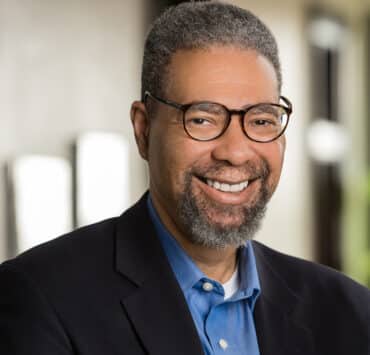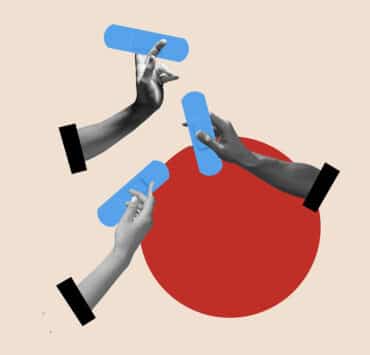The COVID-19 pandemic hit few industries harder than healthcare, as Shakeeb Akhter, senior vice president and chief information officer at Children’s Hospital of Philadelphia (CHOP), can attest. Now, technology and data analytics are playing key roles in not only helping CHOP to achieve its mission—“to provide the best care to children,” Akhter says—but also in addressing today’s challenges impacting the industry.
In response to those challenges, Akhter remains laser focused on one question: “How do we transform all of our operations and care delivery models and use technology and data analytics to create efficiency and a seamless patient experience?”
Born in Pakistan, Shakeeb Akhter lived in Saudi Arabia until his family moved to the United States and settled in Lansing, Michigan when he was nine years old. He then relocated to Chicago, where he remained for more than twenty years until he moved to Philadelphia. His parents came here to provide their children better educational opportunities.
However, Akhter’s family found the first years in the country “humbling.” Before moving to the United States, his father, an electrical engineer, worked on some of the largest construction projects in the world. Here, he contributed to much smaller projects, and had to take a second job at a retail store. His mother, who had a masters in biochemistry and was a lab technologist and teacher in Saudi Arabia, worked at Burger King before she earned her phlebotomy license.
“How do we transform all of our operations and care delivery models and using technology and data analytics to create efficiency and a seamless patient experience?”
Shakeeb Akhter
“My father’s attitude was ‘If it needs to get done, I will find a way to get it done,’” Akhter notes, adding that he always aspired for more impact and guided them to be successful.
This went a long way toward shaping Akhter’s work ethic. Being the middle child meant “understanding everybody’s perspectives, and the people and communication skills I developed as a kid made me a facilitator,” he says.
Akhter’s background is in economics and the financial services industry. “Data came easy to me, ever since high school and college,” he says. “My first exposure to analytics was during the 2008 financial crisis. I was at Bank of America. I oversaw the PIGS report—as in Portugal, Ireland, Greece, and Spain. As an intern, I was there at six in the morning to calculate how much risk the bank had on its balance sheet and how much cash we had to pay out to mitigate that risk.”
“I realized for the first time the power of data and analytics,” he continues. “I did a complete career shift to healthcare, because I wanted to do something more meaningful.”
Shakeeb Akhter saw data come to the forefront in healthcare during the height of the pandemic. “From determining how many beds we had available to ensuring there were employees to cover shifts, monitoring our supply levels, ramping down, then ramping up our services, data was at the root of all decisions being made at CHOP. I can’t imagine how we could have gone through COVID without the data and analytics infrastructure we had developed. Our team was involved in practically all aspects of decision-making during the pandemic,” he says. “The tools we developed were used daily by practically all leaders in the system. Many senior leaders mentioned that, without the tools we developed, it would have been much more difficult to run the health system for the last two years.”
In partnership with Physician and Strategy leadership, Shakeeb Akhter also leads digital transformation at CHOP, which he describes as a way to use technology to reimagine healthcare, reduce burnout for clinicians, create a seamless patient experience, and advance operations using automation. “My role is to be an enabler,” he says, “to find areas where there are operational, clinical, or business problems that can be solved by technology or data. Then bringing cross-functional teams to bear to support our leaders.”
“How do we transform all of our operations and care delivery models and using technology and data analytics to create efficiency and a seamless patient experience?”
Shakeeb Akhter
Data analytics, he says, allows for a holistic, 360-degree view of the patient. “When you book a flight with an airline, they know who you are,” he says. “They have your frequent flier number; they know your typical routes, your seat preference. We’re trying to do the same thing with healthcare. Data analytics takes into consideration socioeconomic and other factors that will allow us to best engage our patients and build loyalty.”
One of Akhter’s proudest achievements over the last two years is creating a COVID executive dashboard. This represented the first time CHOP integrated data across its entire system and allowed the hospital to track overall COVID trends, including clinical and supply chain-related issues.
“Our advanced data analytics models determined whether the hospital would deplete its PPE supply when employees were brought back into work,” he says. “We placed our testing sites based on geo-location of our employees. We refreshed our visitation policies by looking at the data and we monitored the number of respiratory infections by geography, which served as an early indicator on which sites may begin seeing a larger number of COVID positive patients.”
Another innovation the Information Services team created was an employee symptom screening app, which allowed them to jump on a chat bot if they thought they had symptoms and report them to the contact tracing center as needed. The information services team also launched a patient telehealth program in a few weeks. “We went from essentially no virtual telehealth visits to thousands of visits a week, because there was no other way to see your patient,” he says. “We had to build a platform resilient enough for all physicians to use, and then train them on it.”
Among the best compliments Akhter says he’s received are from clinicians and operational leaders telling him, “You and your teams are providing us tools and insights that make our lives easier,” and from clinicians connecting his team’s work to better patient outcomes. “Because of data analytics,” he says, “we have been able to identify an issue earlier and respond to it quicker.”
His successes, both qualifiable and quantifiable, might stem from two pieces of advice Shakeeb Akhter received over his career that stay with him. One came from his father, who told him, “People don’t care what you know; they care how you make them feel.” The other he credits to a mentor, who told him, “Healthcare IT is people, people, people.”
“That really resonated with me,” he says, “because everything we’re doing from a technology perspective is impacting somebody on the front lines.”
Qlik:
“Children’s Hospital of Philadelphia is a leading pediatric hospital and research facility, and was recognized by Forbes as one of America’s Best Large Employers. Shakeeb Akhter’s visionary application of DataOps helps CHOP better serve its commitment to exceptional patient care, training new generations of pediatric healthcare providers, and pioneering significant research initiatives.”
–Brad Eckler, Field Sales Director, Healthcare


